#could yap for hours about this
Explore tagged Tumblr posts
Text
Curly isn’t just a “man protecting a man” from his actions, he’s an amazing juxtaposition of both victim and witness. There is an unspoken story of potential sexual abuse in the relationship between Curly and Jimmy told exclusively through the pill sequences. The choking and gasping as Curly is forced to have pill after pill shoved down his throat while Jimmy gets his own private high off of knowing the power he now holds over the ex-captain. Anya isn’t the only one being forced to take blame from her rapist, Curly experiences a similar experience as Jimmy contemplates cannibalising him, forcing his autonomy over Curly’s own and blaming him for making him do something Curly has no control over.
#could yap for hours about this#Mouthwashing#curly mouthwashing#jimmy mouthwashing#anya mouthwashing#mouthwashing analysis#game analysis#woo
114 notes
·
View notes
Text
Gravity Falls but Bill’s “i like Mabel cuz she’s an agent of chaos” opinion is actually correct
aka a drawing of my au that has been living in my brain rent free for the past several months

#i don’t even have a name for this au yet#i just call it the “chaotic neutral mabel au”#cuz imma be honest i don’t think mabel could ever be ‘chaotic evil’#at least not her canon version#to my defense i always sucked at naming#gf#gravity falls#gravity falls au#mabel pines#MY ART WOO#the henchmaniacs in the background look so silly…. i couldn’t bother to draw them better im sorry#okay i’m not sorry#except for pyronica; i’m actually sorry i didn’t spend more time drawing her#forgive me god for i have sinned (not drawn pyronica pretty enough) </3#i don’t think this trick will work with my minimal amount of followers but if anyone is interested i could yap about this au for hours#despite the fact that its kinda unfinished lol#chaotic-neutral Mabel au
2K notes
·
View notes
Text







j-hope: BTS, Solo Projects & Tour | Zane Lowe Interview
#btsgif#btsedit#dailybts#userdimple#raplineuser#rjshope#userkelli#userpat#usersky#annietrack#hobi#hoseok#my gifs#see this is what i was yapping about the other day!!!!! i never NEVER feel unloved by him and i love how much gratitude he has for us#and this is the exact same gratitude i feel towards him i CANTTTTTT im gonna love him forever#i also just love interviews like this i could listen to him for hours on end he's so nuanced about everything
607 notes
·
View notes
Text
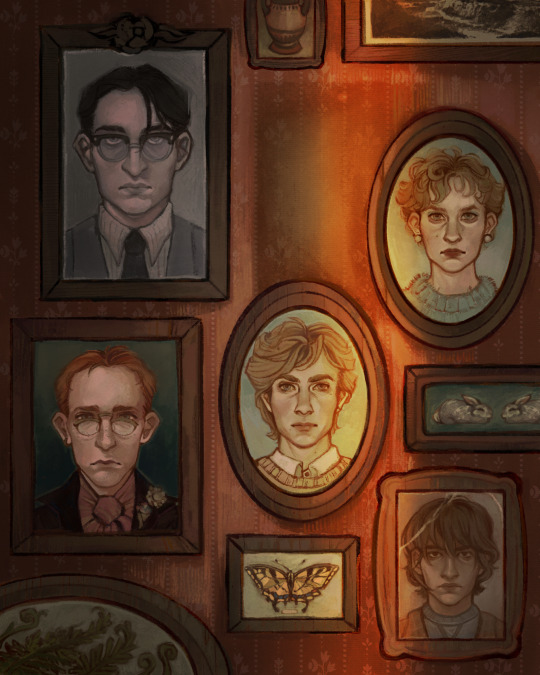
Gallery wall (2025)
#I could yap for hours about my thought process behind their designs#should I make a seperate yap post?#what bugs me is henry's browline glasses I literally saw the line saying he has the same glasses as bunny just after I finished this drawin#want to make more tsh fanart in the future#a dinner scene perhaps?#art#artists on tumblr#digital art#digital painting#illustration#procreate#fanart#the secret history fanart#the secret history#henry winter#camilla macaulay#charles macaulay#francis abernathy#richard papen#bunny corcoran#donna tartt#literature#books#literature fanart#dark academia#gallery wall#tsh#tsh donna tartt#tsh fanart
379 notes
·
View notes
Text
Manfred Von Karma did not burn Phoenix's letters to Miles.
Like, I'm not even saying this to defend Manfred's character (though the fanbase does get a little crazy with what he actually did and didn't do) I'm saying this because that's not canon. I'm not sure it was even possible in canon.
Phoenix didn't write letters to Germany. He didn't know Miles was in Germany, let alone Von Karma's address. He didn't even know who Von Karma was until Edgeworth told him about Manfred in Turnabout Goodbyes.
In the game canon, Miles just stopped showing up to school one day. All Phoenix seemed to know was that he transferred schools suddenly. He didn't know why or where to. Remember, Phoenix didn't even hear about DL-6 until Turnabout Sisters when Maya mentioned her family's involvement.
Even in the anime canon (I haven't watched the anime in a while so I might be off about this) where Phoenix and Miles get a chance to properly say goodbye, Phoenix still doesn't have a direct means of contacting him. His best way of doing so was dedicating a song through the radio using Signal Samurai codenames and hoping Miles would hear it.
Phoenix mentions trying to contact him several times when explaining their relationship to Maya, but this was after finding out Miles was this "Demon Attorney". Miles would have to be at least 20 at this point in time, living back in California with at least a few trials under his belt. With how young he reached success, it's not impossible Miles was living on his own at the time. Even if he wasn't, I doubt Manfred was going through this grown adult's mail.
No, what the game seems to be implying is that Miles ignored Phoenix. (Maya even says, "I guess he didn't want to hear from his old friends.") And I don't think this was out of hatred or anything, I think Miles just wanted to forget his past entirely because even the good memories of his childhood would be bittersweet at best.
And to be honest that makes it even more tragic to me. Why do we need Manfred to intercept their connection when Miles' trauma and guilt complex is already doing that?
I like to think Miles knew Phoenix would be asking questions if he ever responded to those initial attempts at contact. Questions he of course doesn't want to answer because they'd at best open old wounds or at worst risk his childhood friend finding out he might have committed patricide.
I also like to think he knew Phoenix of all people would stubbornly try to find the answers Miles wouldn't willingly give because he literally mentions Phoenix always being "single minded in his work" and "always seeing things through to the end". If anyone was going to press and bring those uncomfortable and painful memories out in the open for the sake of "helping him", it would be Phoenix Wright.
Why do we need Manfred to take away all that complexity and tragedy? That is such a waste!
#also Manfred didn’t know who Phoenix was#even when they were opposing council he didn’t recognize him outside of court#yes it's fine to bend canon when writing fanfic of course#but like it's so overdone and accepted as canon#just...guys there is so much angst and amazing character study RIGHT THERE#why do we need a villain to do something so petty when there's enough angst in canon characterization#god if i could write maybe I'd make a fanfic about this fhfhdh#feral yapping hours#manfred von karma#miles edgeworth#phoenix wright#wrightworth#narumitsu#ace attorney
1K notes
·
View notes
Text
In light of Eitaku/Aotsumi somewhat like kinda sorta really getting confirmed to some degree, I kind of want to yap about how crazy they both are
(Warning for Spoilers + discussion surrounding the Prologue, True, Multiple Eitos, and Goodbye Eito Routes Below)
Like, where do you begin here? They’re practically made for each other, Takumi killing him [and absorbing his hemoanima] in route 0 was /the/ damning act that bound them together for every reset thereafter. They bring out the absolute best and worst in each other, and prove that they both, deep down, lack the strength to carry out their convictions despite the gravity that they’re treated with. They both possess qualities that, at a surface level, seem completely at odds with their respective goals.
Takumi is, as we know, majorly invested in saving everyone — he takes on this savior/martyr role where he shoulders basically every act that requires judgement some way or another, including everyone’s burdens and the continued war effort. He is so deeply entrenched in the belief that if no one else does it, he has to, to the point of actually being pretty brutal about it; in these positions where he has to make increasingly difficult decisions, he’s the one who has to choose the most pragmatic options — even if it directly leads to others, and often himself, getting hurt — for the sake of survival, to make it to the end of the 100 days.
Really, there’s a sort of resignation to Takumi’s character where he actually ends up being pretty complicit to [often needless] violence when the situation “calls for it” (ie. Eva getting repeatedly tortured). He’s not usually in a position where he protests wrongs (even if he internally disagrees with them), instead seeing the war (and by extension the violence associated with it) as an inevitability — an immutable factor. He’s more on the reactive side than proactive. If given the mullen, he will bite it, often unquestioningly. Takumi is a character that changes drastically depending on the choices that are made, but I’d argue on an overarching level that it’s the possibilities that he considers that really define him as a character. Everyone knows that Eito’s skill names (judge, jury, and executioner) reflect him on a personal level, but Takumi is put in the same position time and time again, as well. (Notably, Takumi’s foreknowledge and past experiences do have the tendency to inhibit his ability to make sound judgement — there’s a reason that court of law deems evidence of other unrelated crimes inadmissible because it interferes in judging the here-and-now).
* One of my favorite aspects of the Multiple Eitos route is Takumi’s tangible shift in thought process — from “Why didn’t I choose to spare him?” to “Why did I let him live in the first place?” I like how the true route sort of pushes that further, in the way it encourages you to take certain options (choose Kyoshika, to help Nozomi and Kurara reconcile, and because she has additional dialogue that makes her death seem less cruel and more willing; choose Gaku because he is vital to learning more information; let Shouma kill Eva because it is vital to learning more information and because Eva is an ‘uncontrollable and unstable variable’ not worth investing in any longer). He’s so viciously pragmatic at times — a true “Whatever it takes” mindset (and showcase of his circular reasoning).
On the other hand, there’s Eito, who lands on the opposite side of the spectrum with this “Hell is other people”-oriented worldview (a fallacy of mind projection). He hates humanity with a passion, he believes himself fully righteous having been given the ability to see humanity for what it really is, and thus he feels justified in carrying out the extermination of all of humanity. There is an emotional core to his ideals despite him initially presenting cold, harsh logic and cunning — the fact that he grew up isolated from the world around him, in reality wanting companionship but being unable to trust in it both due to his affliction, being alone in his affliction, and the evidence he bases his logical argument around (the books that he read). Even then, the books themselves end up being a supplement to his lack of human connection, a grasp for some sort of understanding — for something to reaffirm the world he views on an outward level so as to justify it(s) (and his) existence. With Eito, there’s a repeated motif surrounding him about what it means to be defective, a glitch, an aberration, an uncontrollable variable that’s (as stated later on by Sirei) not meant to be there — something that Eito protests long before the nature of his exact existence is revealed. It’s clearly a doctrine that he is intimately familiar with having grown up more or less confined to a hospital after his own parents — who are supposed to be the very epitome of unconditional love (which extends to forgiveness) — gave up on him, leading to his inability to comprehend it.
I should say, the intriguing part about Takumi to Eito is that by the first reset, Takumi has effectively made himself an outlier just as Eito has been; it’s the fact that Takumi has the option (and is narratively compelled) to give Eito not just a second chance, but a third chance, at living and proving himself despite having multiple timelines (as a testament to his ability to be irredeemably reprehensible) stacked against him. Would I call it unconditional love, per se? Not really. But it is this idea that, in spite of all of Eito’s faults and his standing as a variable that is technically illogical to keep around during a war that begs vicious and inhumane pragmatism, Eito has a right to exist. It’s this that has him opening up his world just enough to let the Special Defense Unit exist beyond a generalization — or to at least entertain the idea of it.
* On a semi-unrelated tangent, the choice to have Eito literally rip out his eyes and replace his previously clear-viewed lenses with tinted frames is absolutely interesting thematically; although there is the aforementioned emotional point in his worldview, he tends to operate on a sort of unrelenting vicious logic when it comes to humanity that leaves little to no room for stragglers. He places a lot of value in his judgement and where he stands so as to make [what he perceives to be] the correct choices both strategically and when it comes to justice and comeuppance. He puts an insane amount of pride in his ability to ‘see clearly’, so both the fact that he willingly discards that and sees it as absolutely necessary to trust the others as his comrades goes to show that he believes himself to be impeding on his judgement to take that leap.
That said, Eito’s perspective, while very extremist, is absolutely a necessary counterbalance to the war effort and the predatory nationalism of the Last Defense Academy. Takumi states time and time again that he dreads learning new truths, often wishing he never learnt them at all. Eito, on the other hand, actively searches for the harsh reality of the aforementioned war effort even if it comes from a place of bad faith. Just the introduction of skepticism goes a long way, and it’s that that allows the others to humanize the Futurans instead of giving in to the rampant propaganda presented by the Academy. At the end of the day, it’s about reaching this middleground: “humanity can be terrible, we have been made to do something terrible for the sake of survival, but that doesn’t define our future — we can take the initiative to right the wrongs of our predecessors.”
Anyways, when it comes to Eitaku, there’s a definite push-and-pull dynamic here. They have the mutual ability to bring out the best in each other just as they have the ability to bring out the absolute worst. As stated, a defining part of Eito’s character is his need for autonomy and control when the circumstances of his birth were outside of it (control is a facet of Takumi’s character, albeit in a different way — ‘Its your future!’). By killing Eito, Takumi is both corroborating Eito’s cynicism regarding humanity and completely removing his agency — his opportunity to redeem himself.
In ways of the former, it’s about bringing each other to the very brink of hate-filled insanity as a twisted form of companionship (Eito absolutely sees Takumi as his nemesis, but up until then was seen more like a roadblock to work around for Takumi. Multiple Eitos revolves around actualizing the former until it’s mutual. This, in itself, is a form of understanding. For Takumi, dropping down to Eito’s level; for Eito, radicalizing Takumi up to his). As for the latter, the Multiple Eitos Route is exactly about repaying that in kind (literally taking over Takumi’s body, denying him the ability to save his friends, making his time-traveling escapades effectively moot).
What’s neat about Multiple Eitos is that it is technically a foil to Goodbye Eito and the True Route. While Multiple Eitos showcases Takumi’s capacity to be rationally cruel to the point of irrationality, the latter routes are case studies in Eito’s ability to display genuine kindness (it’s so important to Goodbye Eito that it’s children that Eito encounters in the perimeters, especially when there’s both a certain sort of childishness to his ideals, and the fact that he killed whomever tried to befriend him as a child; he is given the opportunity to perpetuate the cycle of hatred and isolation he suffered as a child but chooses not to, encouraging them to find community. In a way, the true route encompasses ideas of breaking such cycles, Takumi doing a similar thing when he and the group voluntarily accepts death to stop the massacre of the Futurans — when Nozomi chooses kindness by reaching out to them in spite of the tragedy of her situation).
Tldr; I guess what it really boils down to; I can fix him… or I can make him worse.
#the hundred line last defense academy#the hundred line last defense academy spoilers#the hundred line#the hundred line spoilers#thllda#thllda spoilers#eito aotsuki#takumi sumino#eitaku#aotsumi#I want to preface that this is like. in no way a perfect look at these two. I’m postulating a lot here#and my view of them is like incomplete because I haven’t completed all the routes#so yeah my yapping could be totally nonsensical. SORRY#I’m 100% looking forward to learning evrn more about these losers even if it takes me 200 hours.#possibly the run-on sentence final boss. sorry (x2)!!!!#eitaku live execution NOW !!!!!!!!
169 notes
·
View notes
Text
My toxic trait is that my favoritism for Dick Grayson has no bounds.
#he's just perfect#sorry but if we're talking about dc I'll find a way to bring him into the conversation#I'm so annoying about him#I could yap about his character for hours#there's no top 10 in my character list because dick occupies all the spots#dick grayson#nightwing#robin#dc#dc comics
408 notes
·
View notes
Text
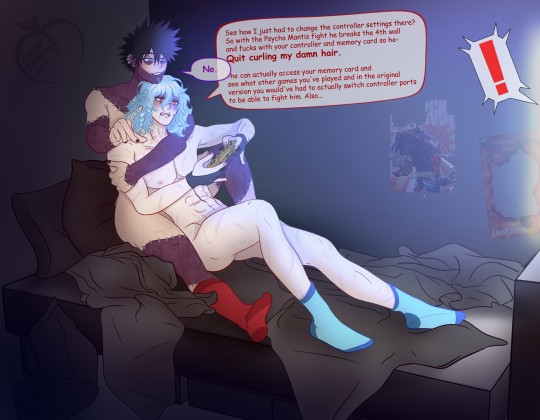
Human curling iron + gamer who doesn't stop yapping ʕ ꈍᴥꈍʔ
Here's a version without the text + a closeup too 🫶💗
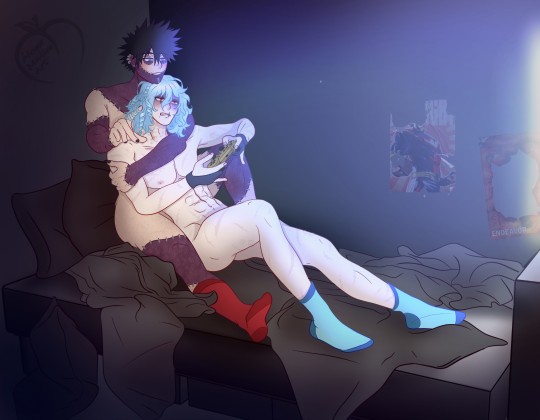
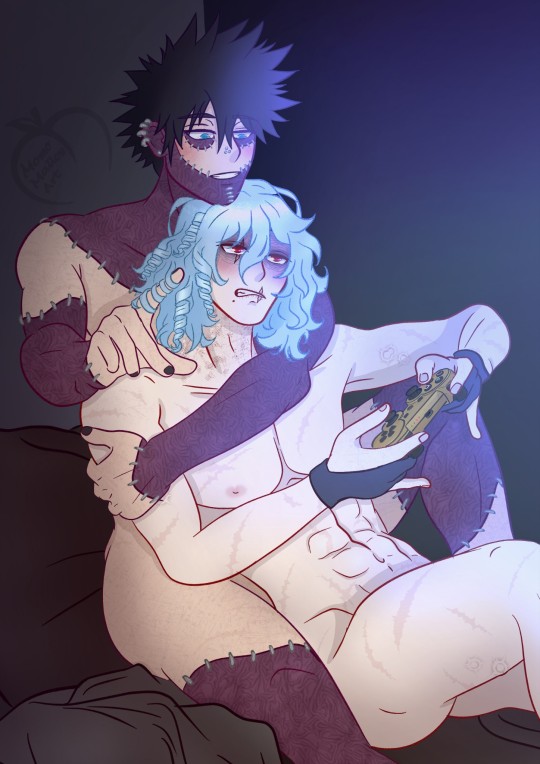
#made a poll on Twitter for ship art and the people wanted the toxic yaoi#the ship has really grown on me#I ship anyone that would make Tomu happy tbh like bro needs a hug idc who he's gettin it from#I wanna do some spinneraki too asp#and togachako#man I love the gays#I HC that Dabi could use his quirk to make his hands hot enough to curl or straighten hair and I think he would be really annoying about it#Tomu complains but he actually loves the attention#Dabi is definitely not listening to his ass yap about MG tho#it's not gay if the socks stay on#its giving 'this guy just nutted in me then info dumped about minecraft for 2 hours'#they're silly#anyways enjoy the food#my art#bnha#mha#my hero academia#shigaraki tomura#tenko shimura#shiggy#Dabi#touya todoroki#shigadabi#dabishiga#red and blue gays#yaoi#do people still tag things with yaoi? idk
382 notes
·
View notes
Text

Huey and Gosalyn have some summer camp fun!!
This may have something to do with a comic idea I had
Ironically this is my last post before I go to summer camp (I kind of hope there are no glowing eyes in the woods but c’est la vie)
I will be back in a week hopefully with more ducktales art!!
Bonus:

(No, no he should not be)
#god I could talk about this comic idea for hours#which is a good sign that I might actually make it#Drake definitely made her join the jwc#this might also have been an excuse to make art of my two of my favorites#(they’re literally me)#also slightly projecting on Gosalyn#I hit her with my Girl Scout ray#guys can you tell I’m really good at backgrounds 😕😕😕#ok yap session over normal tag time#ducktales#darkwing duck#dt17#launchpad mcquack#gosalyn mallard#Huey duck#junior woodchucks#ducktales 2017#also HOLY CRAP I make her hair so much curlier than it is in canon also self projecting mb#my art
468 notes
·
View notes
Text
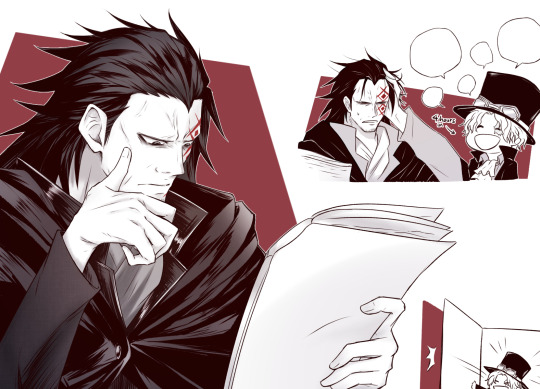
The Sabo part came out of nowhere
#like this was supposed to be a dragon only painting#and then sabo just#busted in#and yapped for 4 hours straight#about luffy ofc#but then the thought of sabo could comfortably yapped dragon’s ear out says alot about their relationship#the fact that sabo not only views dragon as his leader but someone he could talk to about everything even personal stuff#basically his confidant#warm my fucking heart#one piece#one piece fanart#monkey d dragon#dragon one piece#one piece sabo#op sabo#revolutionary sabo#sabo
747 notes
·
View notes
Text
Nora saying that Riko burned the number seven onto Andrew in a universe where Andrew becomes a Raven haunts me. What does it mean? Was it as a punishment for Riko catching Andrew smoking cigarettes? Was it just because of Andrew generally not cooperating? Where did he burn the number onto him? Because there is no way it could’ve been on the cheek where the perfect court tattoos are because that would a thousand percent cause an investigation into the Ravens. He must’ve burned it onto Andrew somewhere that was hidden by their gear. Maybe his back? Or possibly onto his wrists on top of his past self-harm scars? And don’t even get me started on the parallels between this and Neil being burned by a dashboard lighter by Lola and his dad’s men in the book.
#i could yap about this for hours#i can yap#all for the game#aftg#aftg fandom#edgar allen ravens#raven andrew minyard#raven neil#andrew minyard#neil josten#riko moriyama#aftg spoilers
269 notes
·
View notes
Text
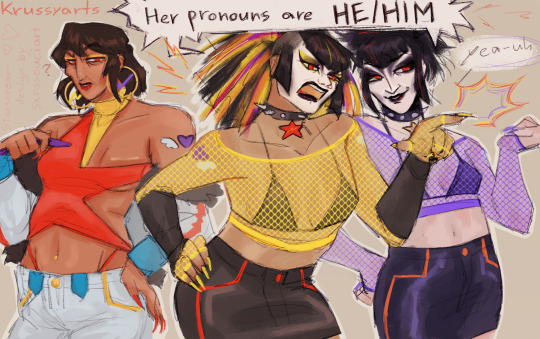
Starscream design by my wonderful girlfriend @sxnssouciart
#her human designs are sooo fucking good can't wait to see them posted on here#we just finished watching earthspark s1 together. which is ofc all there is#and now i have very severe brainrot.#starscream boobie out with the he/him pronouns slay#maccadam#starscream#nova storm#novastorm#skywarp#tfe starscream#tfe novastorm#tfe skywarp#tfe#tf earthspark#transformers earthspark#earthspark#whyy are there so many tags jesus#novas hair colors are inspired by supernovas btw! still feel very smart for that one#i could yap about their designs for like an hour probably so i'll shut up#i'll probably revise them at some point tho#this was supposed to be a doodle T^T#there will be more earthspark#yuriformers#silly
229 notes
·
View notes
Note
I WILL ALWAYS CARE
you don't remember having the 'children' talk as clearly as tomura does.
in fact, you weren't even sure if it was a conversation about having kids persay. because from your viewpoint, all the two of you were doing was going over different files for different candidates wanting to join the league. kurogiri waited in the corner, silent-- but there to offer his opinion if the two of you really wanted one.
there's five files in front of the both of you. the majority are kids. the youngest is nine. tomura doesn't look impressed-- you can tell by the way he breathes even if the hand covering his face blocks his expression.
there's a couple beats of silence before tomura pushes as the files in front of him with a small sigh. "we need to take them in."
"they're kids, tomura," your tone borders on incredulous. "they'll never make it in the league."
"who's going to take care of them?" he responds in a clipped tone, tight and just on the edge of irritation. "some of them are probably wandering the streets right now wondering who is going to save them with quirks like theirs."
your eyes dart down to the files, brushing over the certain pieces on each paper with the labels. mind control. sleep paralysis manipulation. shapeshifting. just some of the few that have already been labeled as villainous-- dangerous if put into the wrong hands. you don't want to think too much about what the hero society would do to a nine year old with sleep paralysis manipulation.
"we... we can't risk that, tomu," your voice is gentle and level-- as it always is when in the 'situation room' with him. tomura trusts you the most, that's why you help him pick new members and help plan missions and orchestrate meetings. he trusts your judgement. "they're so young, they'll get hurt--"
"would you rather them get hurt by themselves in some random alleyway where noone will come to their aid?" you wince at his tone. of course not, you'd never want these kids to go through what either of you had to endure before you got to this point.
"we're not babysitters," you manage to get out. you're firm-- kids shouldn't be anywhere near the league for their own safety. you'd never forgive yourself if you sent them out on some mission that they couldn't handle and don't come back from.
there's a scoff that leaves his mouth. "i'd rather they die fighting for something they can call home instead of dying alone."
you chew on the inside of your cheek. the subject is dropped.
within the next couple of weeks, giran brings each of the five individuals that you and tomura had stewed over for hours.
none of them last long at all.
© accidentcache do not repost, translate or alter my work without permission. all rights reserved.
#cache money!#27au tomura!!!!!#auuuugh i need more i NEEEEEED more#if i could just yap abt them both for hours i WOULD.#i have a whole story and lore about them planned out just UGH.#bugsyonline#bnha#mha#my hero academia#boku no hero academia#shigaraki tomura#tomura shigaraki#mha x reader#bnha x reader#tomura x reader#shigaraki x reader#tomura shigaraki x reader
146 notes
·
View notes
Text
The whole reason “death becomes her” is that only when Madeline and Helen drink the potion and technically die do they feel both the ability to start living and begin to reflect on their failings as people. It’s a sad irony that only do they feel free to live once they no longer have the pressure of aging upon them. Even though the truth of the matter is they spent those years in scrutiny and competition, so they were never fully enjoyed. Demise became an inevitable “when” not “if.” Furthermore, after realizing the scope of their choice in death do they finally understand how fractured, flawed, and years of infighting led them to being not great people nor living fulfilling lives. Their external vanity (Madeline especially *cough cough*) did not reflect better talent, morals, nor relationships.
Death becomes her, or them, because that is their rebirth, the catalyst to hopefully change as people for the better and use one another for support and acting selflessly. Only then, when they realize this and find each other, live for each other, do they become truly “becoming” or beautiful.
#this show is so much more than it appears and I could yap about it for hours#death becomes her musical#death becomes her#madhel#madeline ashton#helen sharp#mad x hel#megan hilty#jennifer simard
75 notes
·
View notes
Text

A LITTLE OUT OF CONTEXT SINCE I HAVEN’T FULLY CAUGHT UP WITH UPLOADING MY TOH ART ONTO TUMBLR… but!! Today (Oct 4) marks the 1-year anniversary of my Pittwins Ghost AU :)
I got so much art and story for this thing, I cannot wait to start sharing it here. The brainworms, guys…. the brainworms……
#the owl house#toh#pittwins#pittwins ghost au#luz noceda#luz toh#hunter toh#niko art#i could and have yapped about this au for hours#ghost Luz and ghost Hunter my babies#they’re just little guys#gonna start posting my backlog for this AU like imminently
233 notes
·
View notes
Text
i lied. put your clothes back on. we're gonna look out the window for three hours while i tell you about the suitcase metaphor in the catcher in the rye and how important it is because of how it describes class and the novel's time period in such a simple, easy way, even though it is hugely overlooked by most readers.
#tcitr#the catcher in the rye#god i love that book i could yap about it for hours#(i probably already have to some of my friends lmao)#anyway yea :)#bee fangirls#bee is a nerd
92 notes
·
View notes